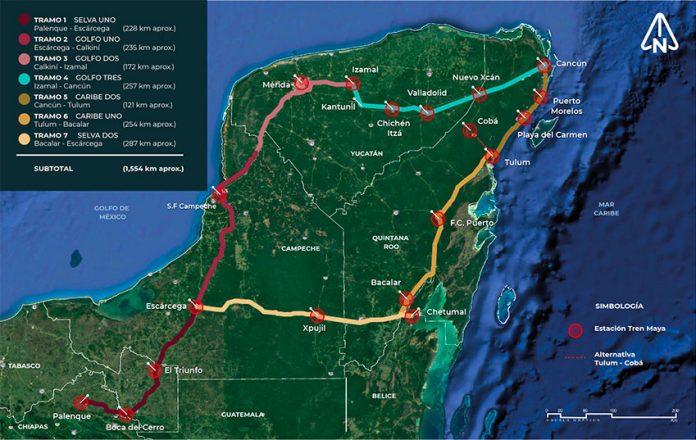A group of United Nations officials has written to the federal government to express concerns about possible human rights violations related to the construction of the Maya Train in Mexico’s southeast.
Six UN special rapporteurs in areas including human rights and indigenous rights told the government they are concerned about possible impacts of the US $8-billion railroad project on indigenous communities in the five states – Chiapas, Tabasco, Campeche, Yucatán and Quintana Roo – through which the train will run.
They said that indigenous people’s land rights, including the right not to be evicted, and their right to health could be adversely affected by the train, the federal government’s signature infrastructure project.
The rapporteurs also said they were concerned about “information indicating that the environmental impact study for the project has been inadequate.”
An inadequate assessment entails “risks of environmental damage,” the letter said, explaining that there could be negative impacts on biodiversity and water sources in the regions through which the tourist train will run.
The UN officials also said that it has been confirmed that the consultation process that preceded the approval of the Maya Train project, including a vote that found 92% support for it, violated people’s rights.
They said there is information that shows that the process was imposed on residents even though the decision to approve the project had already been taken.
The special rapporteurs also said the consultation process was not “culturally adequate” and that “complete, adequate and impartial information about the project and its potential impacts” was not presented to residents because the necessary environmental impact and social studies had not been completed.
The United Nations said shortly after the vote was held last December that it failed to meet all international human rights standards.
The rapporteurs said the UN has received reports of people being harassed if they sought more information about the project or more time to make up their minds about it, or if they expressed opposition to it.
Human rights defenders that have filed legal action against the Maya Train have been criminalized, defamed and discredited, they said.
The officials also expressed concern about the “possible militarization” of Mexico’s southeast while the railroad is under construction because the government has announced that the army will build two sections of it.
They requested a range of information from the government including details about the process to acquire land and an explanation as to why the decision was taken to make use of the military in indigenous territory.
The special rapporteurs also sought a guarantee that there will be no aggression against people who oppose or question the project.
Construction of the Maya Train was officially inaugurated by President López Obrador on June 1. The 1,500-kilometer train line is slated to have 18 stations in the five states through which it will run.
Numerous environmental concerns have been raised about the project and injunctions obtained by indigenous communities have halted parts of it, at least temporarily.
The government says the construction and operation of the railroad won’t cause any major environmental damage and López Obrador has pledged that it will spur economic and social development in Mexico’s long-neglected southeast.
The president said in June that the project will be finished in 28 months, or by October 2022, stressing that no excuses will be accepted for delays.
Source: Reforma (sp)
